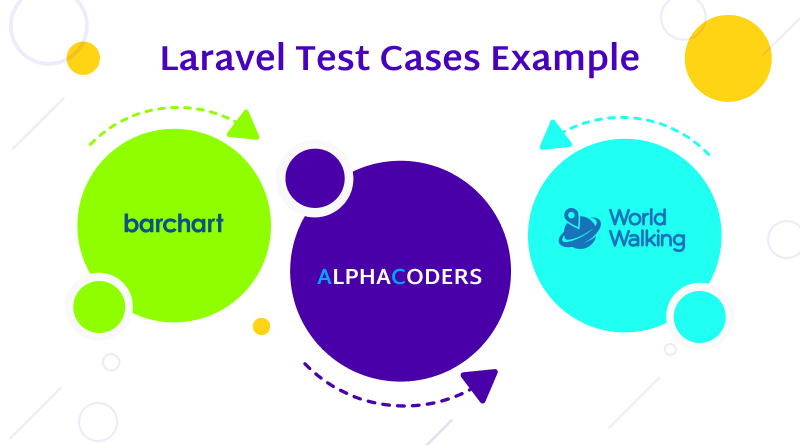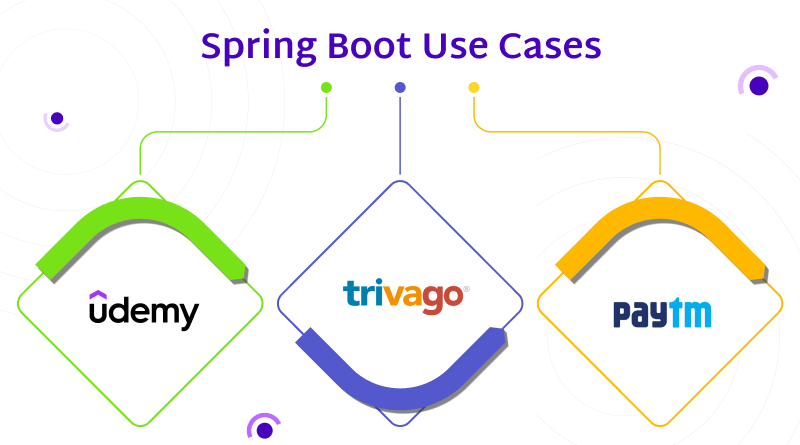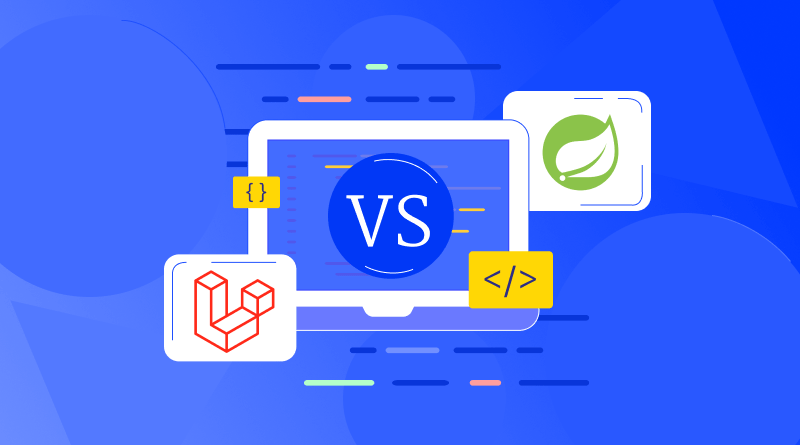A web developer needs different frameworks to build their websites. Sometimes it could be the best PHP frameworks also like Laravel. However, meeting the distinctive needs of web development tasks and projects is not possible with one web framework. There is a popular Java framework Spring Boot which can be considered as the Laravel alternative to building websites. That is why we have brought this guide on Laravel vs Spring Boot.
So, all backend developers, follow this guide and find the right framework between Laravel vs Spring Boot for your next web project.
Table of Content
Laravel vs Spring Boot: What is Laravel?
Thanks to Taylor Otwell who developed Laravel in 2011. Since then Laravel has been the best PHP framework which follows the Model-View-Controller (MVC) architectural pattern. The leading web development framework focuses on simplicity and readability, and PHP developers especially those who are reading this guide will understand the significance of Laravel.
You don’t have to pay any additional amount to access Laravel! Live stress-free as it is open-source and find its source code in the GitHub repository. If you are tech-savvy, don’t miss to refer to documents in the repository.
Laravel Test Cases Example
Are you keen to know the famous use cases of the Laravel framework? Here are some of the popular websites using it.

Barchart
Do you love forex trading? How can anyone ignore Barchart? It is one of the leading forex trading software worldwide. It provides quick insights into forex trading, stock trading, and investment related opportunities in the US, UK, and Canada market.
AlphaCoders.com
Search anything whether wallpapers, gifs, animation, or other content on AlphaCoders.com. You can say it is the Google of avatars and artistic content. All credit goes to the Laravel framework that defines its uniqueness.
World Walking
If you need motivation to continue walking, World Walking is the right platform to accept the walking challenge. In this, you can share your experience as well with the community members.
Laravel vs Spring Boot: What is Spring Boot?
Imagine you’re a coder and you want to build a web application with Java. Normally, there’s a lot of setup and configuration involved, like setting up servers and writing a bunch of code before you can even get started on the real fun stuff.
Spring Boot is basically an extension of the Spring framework that Java backend developers use. If you want to know the difference between both, read our Spring vs Spring Boot guide. There is minimal effort required in developing Spring-based applications. This Java-based framework simplifies the web development process through automatic configurations. Hence, their Java backend developers can save their manual efforts in building robust Java applications.
Spring Boot Use Cases
Let’s explore the popular spring boot use cases that play a pivotal role in the industry.

Udemy
Many corporate learners use Udemy to bridge their learning gap. But did you know that the online learning platform having 175,000+ courses is built on the Spring Boot? Udemy used this framework because it makes eLearning accessible for all learners.
Trivago
Hotel? Trivago! You may have heard this punchline in different Trivago ads. Browsing hotels and transportation on this platform is possible because of Spring Boot usage. Because of this, they are able to handle volumes of customer requests.
Paytm
Paytm Karo you do when you need to process an online transaction. But to facilitate this process between your mobile device and payment soundbox is possible because of the Spring Boot. Their mobile application is built on this Java based framework.
Laravel vs Spring Boot: Key Differences
The difference factor between Laravel and Spring Boot which we have mentioned below. Let’s decode each one of them. To summarize, we have also provided a comparison table of Laravel vs Spring Boot.
| Features | Laravel | Spring Boot |
| Programming Language | PHP | Java |
| Learning Curve | Easier | Steeper |
| Use Cases | Web apps, CMS, small project | Enterprise apps, high performance, scalability |
| Features | Blade templating, Artisan CLI, built-in authentication | Modular, Spring Data JPA, autoconfiguration |
| Microservices Support | Requires additional packages | Fully supported by Spring Cloud |
Syntax Differences
The debate of Laravel vs Spring Boot is genuine if we consider the syntax of both frameworks. Here is a breakdown of the syntax difference between both.
Defining Controllers
Laravel
<?php
class UserController extends Controller
{
public function index()
{
// Controller logic here
return view(‘welcome’);
}
}
Spring Boot (with annotations)
@Controller
public class UserController {
@GetMapping(“/”)
public String index() {
// Controller logic here
return “welcome”; // View name
}
}
Routing
Laravel
Route::get(‘/’, function () {
return view(‘welcome’);
});
Spring Boot (annotations)
@GetMapping(“/”)
public String index() {
// …
}
Programming Language
- Laravel: Laravel is known for its readability and that is why a pool of PHP developers find it easier to mitigate programming errors.
- Spring Boot: Spring Boot is built on the Java ecosystem with matured libraries and frameworks. Its strong typing ensures the code’s stability and reduces runtime errors.
Learning Curve
- Laravel: Laravel is easy to learn and you can also refer to extensive documentation available in forums and the larger community provides ample resources for beginners.
- Spring Boot: There is a steeper learning curve compared to PHP due to its object-oriented nature. As the enterprise level application uses Spring Boot it is also complicated. Hence, for hosting purposes, dedicated hosting servers are useful for building the online presence of Spring-based applications.
Features
Laravel
The blade templating engine in Laravel offers a clean syntax for separating logic from presentation. It also contains artisan CLI (Command Line Interface) to automate common tasks like migration and generating codes.
Spring Boot
The modular approach in the Spring Boot allows developers to choose only the features they need, reducing complexity. Spring Data JPA (Java Persistence API) offers a simplified way to interact with relational databases. Autoconfiguration speeds up development by automatically configuring beans based on project dependencies.
Microservices
Laravel
Laravel can be used to build microservices architecture, but additional packages might be needed for features like service discovery and API gateways. Requires more manual configuration compared to Spring Boot.
Spring Boot
Spring Boot fully embraces microservices with the Spring Cloud framework, providing tools for service discovery, configuration management, and API gateways.
Laravel Vs Spring Boot: Performance
Performance-wise, both Spring Boot and Laravel are meeting industry standards. However, there are additional pointers to consider because of their framework nature.
Spring Boot
- In general, it is believed to offer better performance.
- Java, being a compiled language, can be executed faster than PHP which has been interpreted.
- Microservices are emphasized in Spring Boot so as to achieve modular systems and efficient resource consumption.
Laravel
- It can be fast if well optimized.
- The latest versions of PHP have seen some improvements in their performance (e.g. JIT compilation).
- By using caching mechanisms and code optimization techniques, Laravel can greatly enhance speed.
Factors Affecting Performance
- Application complexity: For simpler applications, the difference in languages may be insignificant. As complexity increases, this becomes more relevant – Spring Boot’s potential performance gains.
- Coding practices: Good coding practice is crucial for either system to outperform the other.
- Hardware and infrastructure: The foundation of the server resources equally impacts the overall application performance.
Spring Boot vs Laravel: Database Support
Laravel
It is to work with databases in Laravel. It has Eloquent ORM, a feature that allows you to consider your database information as if they were objects. Instead of writing complex SQL queries just imagine using a user object directly. Additionally, Laravel can connect with many relational databases such as MySQL, PostgreSQL, and even SQLite for small projects.
Another great feature is migrations. Are you interested in altering the structure of your database? You don’t have to worry! In simple code, Laravel’s migrations define the changes thus making updates smoother and seamless.
Spring Boot
When it comes to databases, Spring Boot simplifies how you communicate with them by utilizing a technology called Spring Data. Think of Spring Data as an interpreter that makes your code understandable by the database. You will talk in plain Java and this software will adapt your words for the system.
But do you know what? That is not all! It does not discriminate against any database hence it can connect to all popular relational types such as MySQL and PostgreSQL, likewise some big names including Oracle and SQL Server. But there’s more! Besides, or also NoSQL databases like MongoDB are very good at keeping huge amounts of unstructured data. So whether you need a traditional database or something more advanced, consider it done if you go with Spring Boot.
The truth is, there’s no single supreme ruler among Laravel vs Spring Boot. It all depends on your project’s needs and your team’s strengths. Laravel’s clean syntax and rapid development style might be the perfect fit for getting a web app up and running quickly. Spring Boot, on the other hand, brings the power of Java and a modular approach to the table, making it a great choice for complex enterprise applications.
No matter which framework you choose, you’ll need a solid hosting partner to keep your web app running smoothly. That’s where Laravel hosting by MilesWeb comes in! They’ve got the expertise and resources to keep your Laravel application humming along, so you can focus on building amazing things.
By understanding your project’s requirements and your team’s skills, you can choose the framework that sets you up for success. And hey, if you go with Laravel, don’t forget to check out MilesWeb’s Laravel hosting – they’ve got your back!
FAQs
What are Laravel and Spring Boot frameworks?
Laravel and Spring Boot are both popular open-source frameworks used for building web applications. Laravel is written in PHP and known for its clean syntax and rich set of features that streamline development. Spring Boot, on the other hand, is a Java framework that emphasizes convention over configuration, making it ideal for rapid application development.
What kind of architecture do Laravel and Spring Boot support?
Both Laravel and Spring Boot are versatile and can be used to implement various architectures, including the widely used Model-View-Controller (MVC) pattern that separates data, presentation, and user interaction.
Which framework is better for rapid development?
If rapid development is your primary concern, Laravel might be a better choice. Its clean syntax, built-in features, and extensive community resources make it easier to learn and use, especially for beginners. Spring Boot, while offering great flexibility, has a steeper learning curve due to its more configuration-heavy nature.
Which framework has better community support?
Both Laravel and Spring Boot enjoy strong community support. Laravel has a large and active community with a wealth of tutorials, packages, and forums readily available. Spring Boot, being backed by the vast Java community, boasts extensive documentation, libraries, and a mature developer base. You’re unlikely to be stuck without help with either framework.








